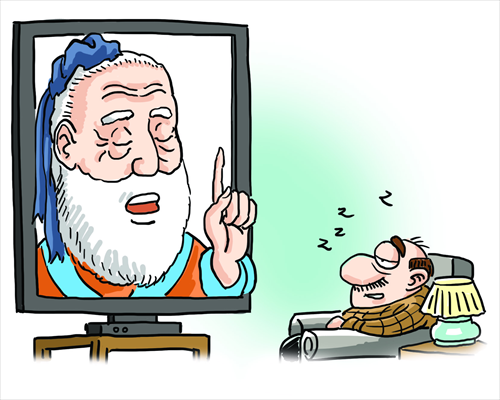HOME >> OP-ED
Cultural exports can't be created by force
Source:Global Times Published: 2014-3-9 19:18:01

Illustration: Liu Rui/GT
Read more in Special Coverage:
Legislation about acupuncture in the US was once beyond imagination. Throughout these years we have realized it at all six levels in the US - the White House, Congress, the Department of Health and Human Services, the National Institutes of Health, the Food and Drug Administration, and state governments.
This is a typical example proving that the essence of Chinese civilization can be accepted if the way of promoting it is in line with the cultural logic of Western society and Westerners believe it is beneficial.
The Chinese dream is an ideal, and we have reasons to be proud of it. In the early 1980s when I left China for the US, liangpiao, or grain rations, were still prevalent in the nation. Today's China has already become the world's second largest economy.
Nonetheless, the nation's economic miracle shouldn't be a burden ossifying our thinking. There are still very detailed, flexible tasks to do to share the dream with the world. China has huge potential to make the dream come true, but such potential hasn't been given full play yet.
From my observation in the US for more than 30 years, I think the Western logic when deciding whether to accept something new is very clear. One needs to answer three questions in order to get the new thing approved: How does it benefit local people at the moment? What's the next or long-term goal? And how can this goal be reached? These were exactly the three questions the US investigators asked when discussing legislation about acupuncture.
This logic certainly applies to China's promotion of its language and culture. You need to first study the demand by the Western social majority, let them see the benefits, and interact with all levels of society to meet that demand.
In the US, the demand for Chinese learning is apparent among at least three groups of people. One is Chinese Americans, who want their second generation to understand Chinese culture and language. There are also people who believe the world's future lies in China and thus learn Chinese to seek a better career. The third group consists of people who learn Chinese purely out of personal interest in Chinese culture.
That said, the approach of "bringing Confucius Institutes to the US" sounds more like a political slogan. Many locals do not even understand why the Chinese, previously restaurant owners and laundry businessmen, now decide to teach Chinese. When they see something that is not in accordance with their cultural logic, they naturally feel nervous or even averse to it.
Just like Chinese acupuncture is now becoming a part of US life as complementary and alternative medicine, learning the Chinese language, if we want it to be accepted by foreigners, must become part of US culture. It is not an industry exported from China, but a service that they truly believe they can benefit from. If we simply apply the mentality of selling a product to the cause of promoting the Chinese dream abroad we may not be successful.
Some have suggested employing local public relations companies to help promote the Chinese dream. This is feasible, and will be more effective than spending money on broadcasting advertisement on Times Square.
The government should have a better understanding of its own role - it should be a platform that provides information and resources, rather than a promoter who gets everything done.
Lots of detailed tasks need to be done, and need to be done patiently. And the focus of interactions with their social majority should be overlapping areas between China and the West.
My US friends and colleagues, including some senators, are all impressed after visiting China and truly learning about the country. Promoting Chinese culture should be a process that naturally enchants foreigners, rather than attempting to force it into Western society. After millennia, Chinese culture is still continuing. We should have confidence in its bright prospects.
The article was compiled by Global Times reporter Chen Chenchen based on an interview with Dr Tian Xiaoming, former commissioner of the White House Commission on Complementary & Alternative Medicine Policy and one of the 35 overseas observers invited to participate this March's CPPCC session. chenchenchen@globaltimes.com.cn
Posted in: Viewpoint